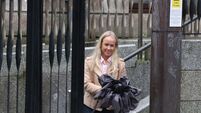Fine Gael's election manifesto wins — and where it lost out in the programme for government

Fine Gael's manifesto called for a cut in the Vat rate from 13.5% to 11% but the party has managed to go further than this and is likely to secure a cut to 9% in the next budget. iStock
Less two months ago, during the general election campaign, Fine Gael launched its manifesto with the party's proposals for government over the next five years.
Pledges to cut taxes, introduce a new saving scheme for children and totally abolish student fees were just some of the pledges the party made.














